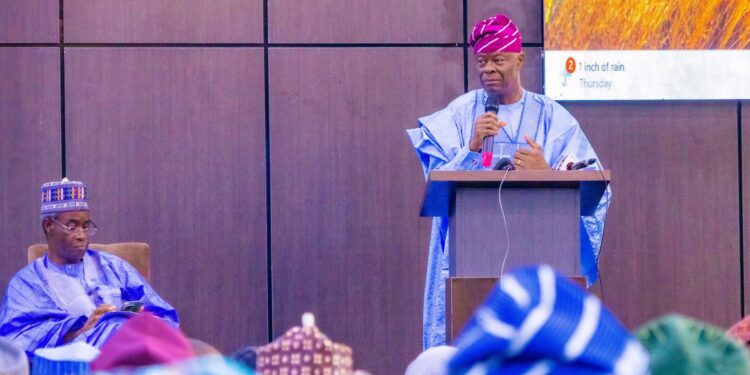The Federal Government has cleared over N2 trillion in outstanding capital budget obligations from the 2024 fiscal year, ensuring that no pending commitments remain unprocessed. This was disclosed by the Minister of Finance and Coordinating Minister of the Economy, Wale Edun, during a Ministerial Press Briefing held on Thursday in Abuja. According to Edun, the payments were made in the last quarter of 2024 to contractors handling various government projects. “In the last quarter, we did pay to contractors over N2 trillion to settle outstanding capital budget obligations from last year. At the moment, we have no pending obligations that are not being processed and financed. The focus will now shift to 2025 capital releases,” he said.
The Minister emphasized that the government is reinforcing strict compliance with due process in public spending. He explained that despite budgetary appropriations, ministries and agencies are only permitted to enter into binding commitments when funds have been duly authorized and made available. This, he said, would ensure efficiency, transparency, and fiscal discipline in the management of public resources.
Edun also highlighted significant improvements in the financial health of state governments, attributing this to regular repayments by the Federal Government of funds previously deducted from the Federation Account. These repayments, he said, have strengthened subnational fiscal positions, increasing the combined surplus of state governments from N2.8 trillion in the first half of 2023 to N7.1 trillion currently.
“Since H1 2023, the combined fiscal balance of the states has grown from 1.8% of GDP to 3.1%, moving from N2.8 trillion to N7.1 trillion. This surplus gives states greater capacity to invest in their economies, with much of the additional spending going into capital projects,” Edun stated.
On the broader economic outlook, Edun reiterated that the Tinubu administration’s medium-term goal remains achieving 7% annual GDP growth. This target, he noted, would be driven by critical government-led investments, robust private sector participation, job creation, and higher household incomes. The government is prioritizing private sector inflows and expanding Public-Private Partnership (PPP) arrangements across key sectors, including agriculture, manufacturing, healthcare, education, and technology.
In terms of fiscal policy, the Minister outlined the government’s stability targets: a fiscal deficit of 3.5% of GDP, debt-to-GDP ratio of 60%, tax-to-GDP ratio of 18%, and a revenue-to-GDP ratio below 50%. He stressed that the economic strategy is anchored on two main pillars — creating a stable macroeconomic environment to foster sustained private sector growth, and strengthening public savings to fund critical investments in infrastructure, human capital development, and agricultural productivity.
Despite global economic uncertainties, Edun noted that Nigeria is making progress in diversifying its export base. He pointed to the country’s competitive exchange rate and strategic advantage under the African Continental Free Trade Agreement (AfCFTA) as opportunities to expand non-oil exports.
This development comes against the backdrop of recent fiscal challenges, including difficulties in redeeming maturing promissory notes and debt obligations earlier in 2025, when the Central Bank of Nigeria declined government requests for overdrafts.
Recent economic data from the National Bureau of Statistics shows encouraging trends: Nigeria’s GDP grew by 3.13% year-on-year in real terms in Q1 2025, up from 2.27% in Q1 2024. Nominal GDP rose to N94.05 trillion from N79.51 trillion over the same period, an 18.3% increase. Growth has been driven by strong performances in trade, communications, and construction, with rail transport, electricity, oil refining, and crop production among the fastest-growing segments of the economy.

Leave a Reply